Organisational Behaviour Report: Waitrose, Module OB, Semester 1
VerifiedAdded on 2020/11/23
|21
|8460
|365
Report
AI Summary
This report provides a comprehensive analysis of organisational behaviour, using Waitrose as a case study. It explores the influence of culture, politics, and power on individual and team behaviour, examining Handy's cultural model and its application within the company. The report delves into various motivation theories, discussing their implementation to enhance employee performance and achieve organisational goals. Furthermore, it examines the dynamics of building effective teams and applies organisational behaviour concepts to real-world business situations. The analysis includes both positive and negative impacts of organisational culture and politics, as well as the role of different types of power in managing company functions. The report concludes with an overview of the key findings and their implications for Waitrose's organisational success.
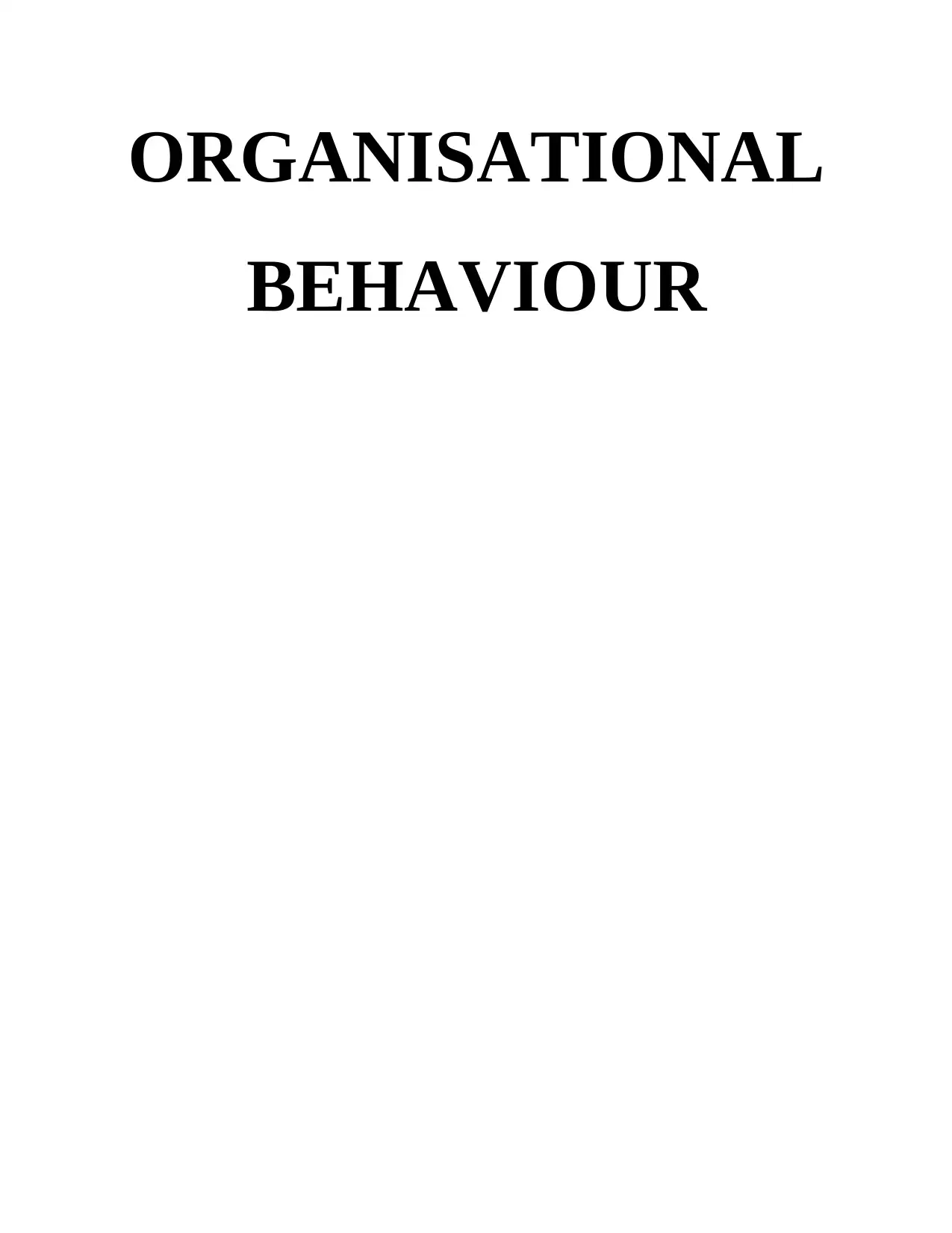
ORGANISATIONAL
BEHAVIOUR
BEHAVIOUR
Paraphrase This Document
Need a fresh take? Get an instant paraphrase of this document with our AI Paraphraser
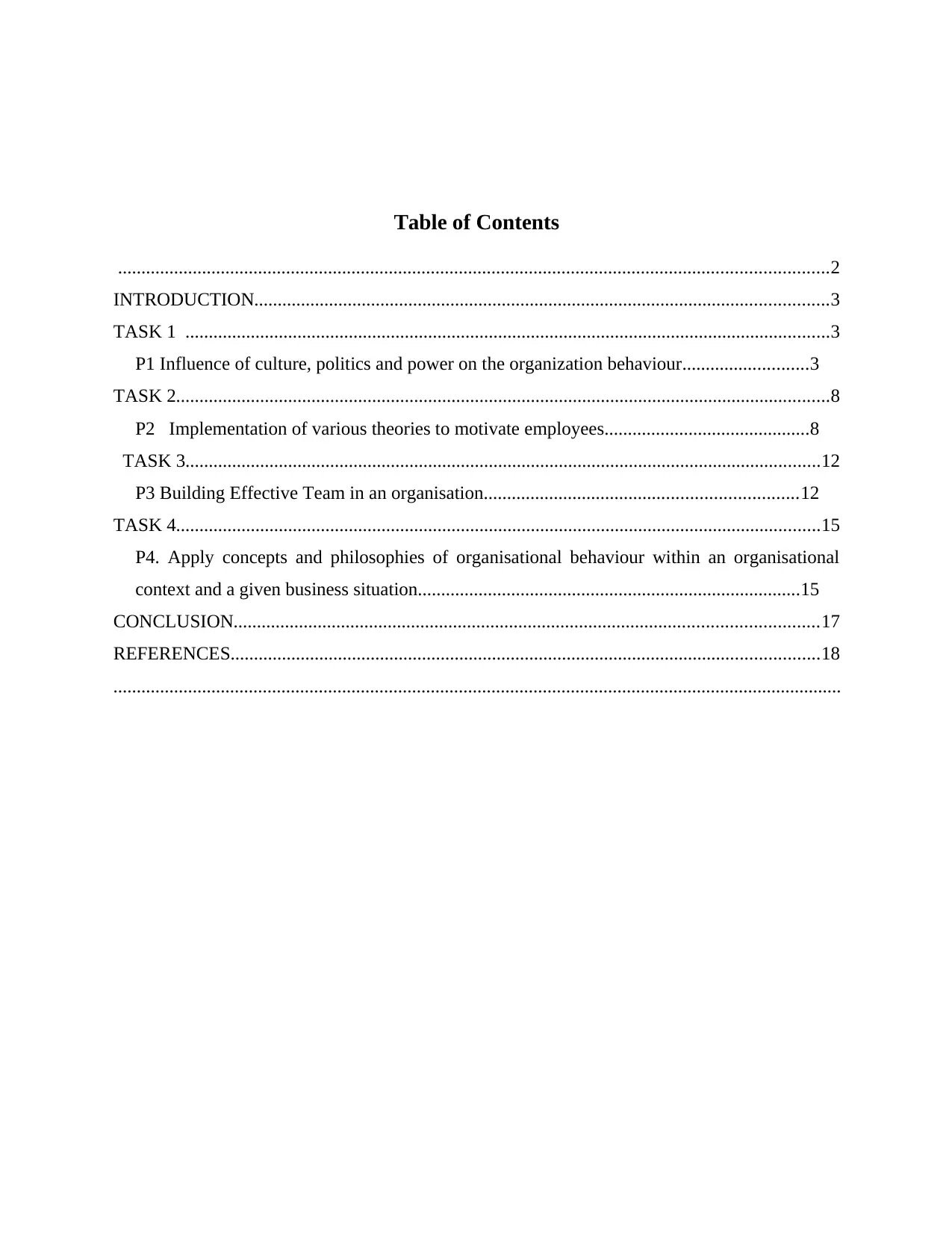
Table of Contents
........................................................................................................................................................2
INTRODUCTION...........................................................................................................................3
TASK 1 ..........................................................................................................................................3
P1 Influence of culture, politics and power on the organization behaviour...........................3
TASK 2............................................................................................................................................8
P2 Implementation of various theories to motivate employees............................................8
TASK 3........................................................................................................................................12
P3 Building Effective Team in an organisation...................................................................12
TASK 4..........................................................................................................................................15
P4. Apply concepts and philosophies of organisational behaviour within an organisational
context and a given business situation..................................................................................15
CONCLUSION.............................................................................................................................17
REFERENCES..............................................................................................................................18
............................................................................................................................................................
........................................................................................................................................................2
INTRODUCTION...........................................................................................................................3
TASK 1 ..........................................................................................................................................3
P1 Influence of culture, politics and power on the organization behaviour...........................3
TASK 2............................................................................................................................................8
P2 Implementation of various theories to motivate employees............................................8
TASK 3........................................................................................................................................12
P3 Building Effective Team in an organisation...................................................................12
TASK 4..........................................................................................................................................15
P4. Apply concepts and philosophies of organisational behaviour within an organisational
context and a given business situation..................................................................................15
CONCLUSION.............................................................................................................................17
REFERENCES..............................................................................................................................18
............................................................................................................................................................
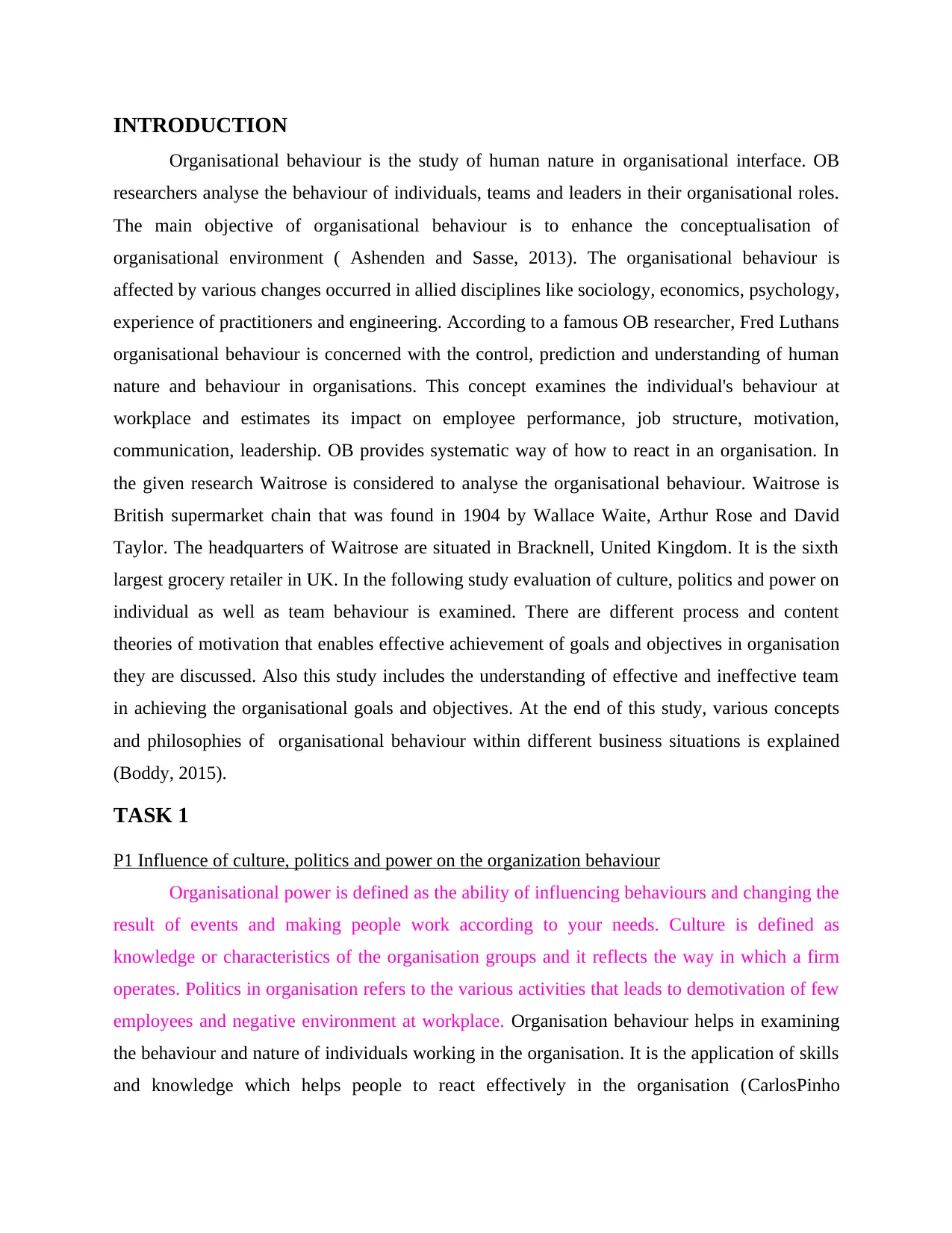
INTRODUCTION
Organisational behaviour is the study of human nature in organisational interface. OB
researchers analyse the behaviour of individuals, teams and leaders in their organisational roles.
The main objective of organisational behaviour is to enhance the conceptualisation of
organisational environment ( Ashenden and Sasse, 2013). The organisational behaviour is
affected by various changes occurred in allied disciplines like sociology, economics, psychology,
experience of practitioners and engineering. According to a famous OB researcher, Fred Luthans
organisational behaviour is concerned with the control, prediction and understanding of human
nature and behaviour in organisations. This concept examines the individual's behaviour at
workplace and estimates its impact on employee performance, job structure, motivation,
communication, leadership. OB provides systematic way of how to react in an organisation. In
the given research Waitrose is considered to analyse the organisational behaviour. Waitrose is
British supermarket chain that was found in 1904 by Wallace Waite, Arthur Rose and David
Taylor. The headquarters of Waitrose are situated in Bracknell, United Kingdom. It is the sixth
largest grocery retailer in UK. In the following study evaluation of culture, politics and power on
individual as well as team behaviour is examined. There are different process and content
theories of motivation that enables effective achievement of goals and objectives in organisation
they are discussed. Also this study includes the understanding of effective and ineffective team
in achieving the organisational goals and objectives. At the end of this study, various concepts
and philosophies of organisational behaviour within different business situations is explained
(Boddy, 2015).
TASK 1
P1 Influence of culture, politics and power on the organization behaviour
Organisational power is defined as the ability of influencing behaviours and changing the
result of events and making people work according to your needs. Culture is defined as
knowledge or characteristics of the organisation groups and it reflects the way in which a firm
operates. Politics in organisation refers to the various activities that leads to demotivation of few
employees and negative environment at workplace. Organisation behaviour helps in examining
the behaviour and nature of individuals working in the organisation. It is the application of skills
and knowledge which helps people to react effectively in the organisation (CarlosPinho
Organisational behaviour is the study of human nature in organisational interface. OB
researchers analyse the behaviour of individuals, teams and leaders in their organisational roles.
The main objective of organisational behaviour is to enhance the conceptualisation of
organisational environment ( Ashenden and Sasse, 2013). The organisational behaviour is
affected by various changes occurred in allied disciplines like sociology, economics, psychology,
experience of practitioners and engineering. According to a famous OB researcher, Fred Luthans
organisational behaviour is concerned with the control, prediction and understanding of human
nature and behaviour in organisations. This concept examines the individual's behaviour at
workplace and estimates its impact on employee performance, job structure, motivation,
communication, leadership. OB provides systematic way of how to react in an organisation. In
the given research Waitrose is considered to analyse the organisational behaviour. Waitrose is
British supermarket chain that was found in 1904 by Wallace Waite, Arthur Rose and David
Taylor. The headquarters of Waitrose are situated in Bracknell, United Kingdom. It is the sixth
largest grocery retailer in UK. In the following study evaluation of culture, politics and power on
individual as well as team behaviour is examined. There are different process and content
theories of motivation that enables effective achievement of goals and objectives in organisation
they are discussed. Also this study includes the understanding of effective and ineffective team
in achieving the organisational goals and objectives. At the end of this study, various concepts
and philosophies of organisational behaviour within different business situations is explained
(Boddy, 2015).
TASK 1
P1 Influence of culture, politics and power on the organization behaviour
Organisational power is defined as the ability of influencing behaviours and changing the
result of events and making people work according to your needs. Culture is defined as
knowledge or characteristics of the organisation groups and it reflects the way in which a firm
operates. Politics in organisation refers to the various activities that leads to demotivation of few
employees and negative environment at workplace. Organisation behaviour helps in examining
the behaviour and nature of individuals working in the organisation. It is the application of skills
and knowledge which helps people to react effectively in the organisation (CarlosPinho
⊘ This is a preview!⊘
Do you want full access?
Subscribe today to unlock all pages.

Trusted by 1+ million students worldwide
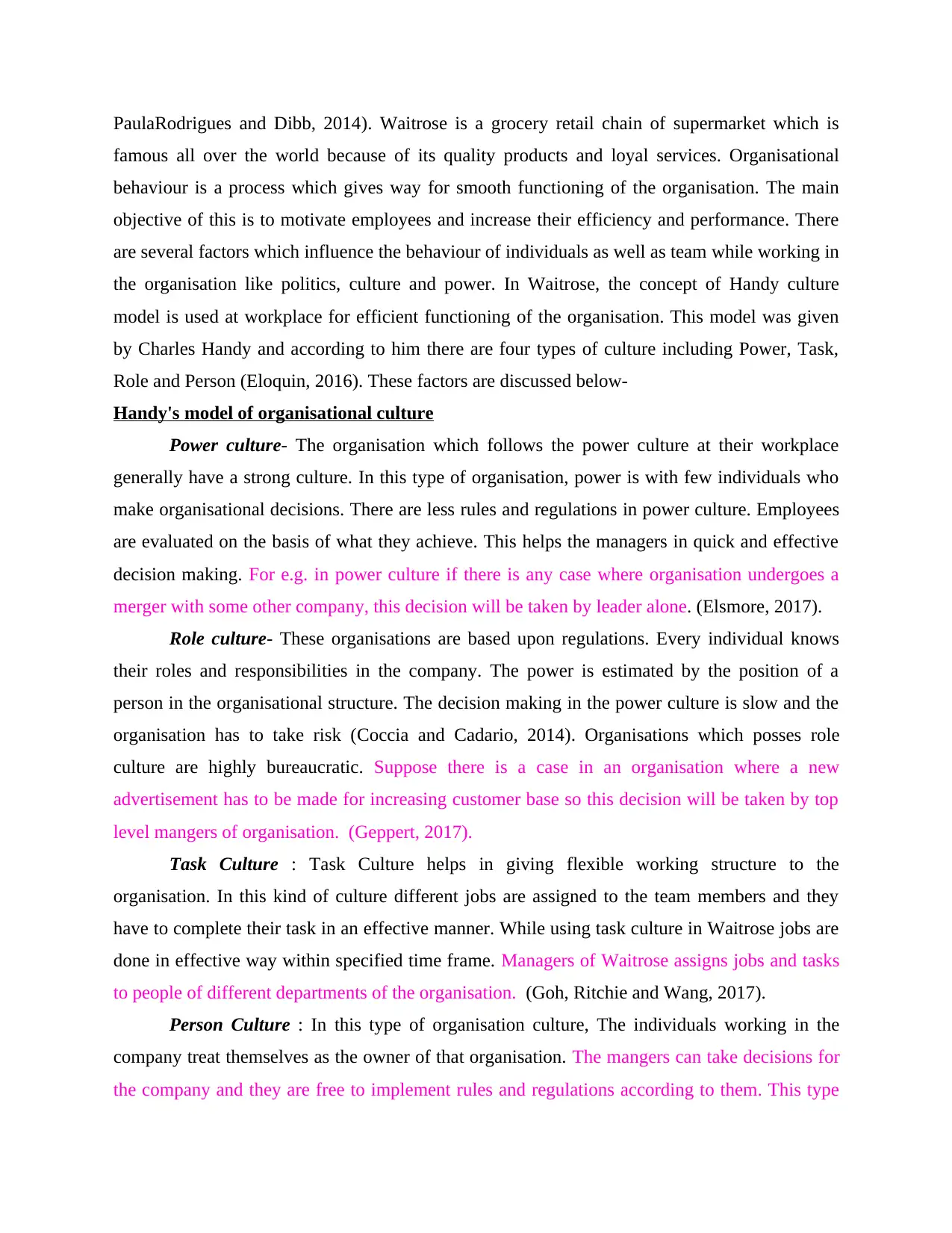
PaulaRodrigues and Dibb, 2014). Waitrose is a grocery retail chain of supermarket which is
famous all over the world because of its quality products and loyal services. Organisational
behaviour is a process which gives way for smooth functioning of the organisation. The main
objective of this is to motivate employees and increase their efficiency and performance. There
are several factors which influence the behaviour of individuals as well as team while working in
the organisation like politics, culture and power. In Waitrose, the concept of Handy culture
model is used at workplace for efficient functioning of the organisation. This model was given
by Charles Handy and according to him there are four types of culture including Power, Task,
Role and Person (Eloquin, 2016). These factors are discussed below-
Handy's model of organisational culture
Power culture- The organisation which follows the power culture at their workplace
generally have a strong culture. In this type of organisation, power is with few individuals who
make organisational decisions. There are less rules and regulations in power culture. Employees
are evaluated on the basis of what they achieve. This helps the managers in quick and effective
decision making. For e.g. in power culture if there is any case where organisation undergoes a
merger with some other company, this decision will be taken by leader alone. (Elsmore, 2017).
Role culture- These organisations are based upon regulations. Every individual knows
their roles and responsibilities in the company. The power is estimated by the position of a
person in the organisational structure. The decision making in the power culture is slow and the
organisation has to take risk (Coccia and Cadario, 2014). Organisations which posses role
culture are highly bureaucratic. Suppose there is a case in an organisation where a new
advertisement has to be made for increasing customer base so this decision will be taken by top
level mangers of organisation. (Geppert, 2017).
Task Culture : Task Culture helps in giving flexible working structure to the
organisation. In this kind of culture different jobs are assigned to the team members and they
have to complete their task in an effective manner. While using task culture in Waitrose jobs are
done in effective way within specified time frame. Managers of Waitrose assigns jobs and tasks
to people of different departments of the organisation. (Goh, Ritchie and Wang, 2017).
Person Culture : In this type of organisation culture, The individuals working in the
company treat themselves as the owner of that organisation. The mangers can take decisions for
the company and they are free to implement rules and regulations according to them. This type
famous all over the world because of its quality products and loyal services. Organisational
behaviour is a process which gives way for smooth functioning of the organisation. The main
objective of this is to motivate employees and increase their efficiency and performance. There
are several factors which influence the behaviour of individuals as well as team while working in
the organisation like politics, culture and power. In Waitrose, the concept of Handy culture
model is used at workplace for efficient functioning of the organisation. This model was given
by Charles Handy and according to him there are four types of culture including Power, Task,
Role and Person (Eloquin, 2016). These factors are discussed below-
Handy's model of organisational culture
Power culture- The organisation which follows the power culture at their workplace
generally have a strong culture. In this type of organisation, power is with few individuals who
make organisational decisions. There are less rules and regulations in power culture. Employees
are evaluated on the basis of what they achieve. This helps the managers in quick and effective
decision making. For e.g. in power culture if there is any case where organisation undergoes a
merger with some other company, this decision will be taken by leader alone. (Elsmore, 2017).
Role culture- These organisations are based upon regulations. Every individual knows
their roles and responsibilities in the company. The power is estimated by the position of a
person in the organisational structure. The decision making in the power culture is slow and the
organisation has to take risk (Coccia and Cadario, 2014). Organisations which posses role
culture are highly bureaucratic. Suppose there is a case in an organisation where a new
advertisement has to be made for increasing customer base so this decision will be taken by top
level mangers of organisation. (Geppert, 2017).
Task Culture : Task Culture helps in giving flexible working structure to the
organisation. In this kind of culture different jobs are assigned to the team members and they
have to complete their task in an effective manner. While using task culture in Waitrose jobs are
done in effective way within specified time frame. Managers of Waitrose assigns jobs and tasks
to people of different departments of the organisation. (Goh, Ritchie and Wang, 2017).
Person Culture : In this type of organisation culture, The individuals working in the
company treat themselves as the owner of that organisation. The mangers can take decisions for
the company and they are free to implement rules and regulations according to them. This type
Paraphrase This Document
Need a fresh take? Get an instant paraphrase of this document with our AI Paraphraser
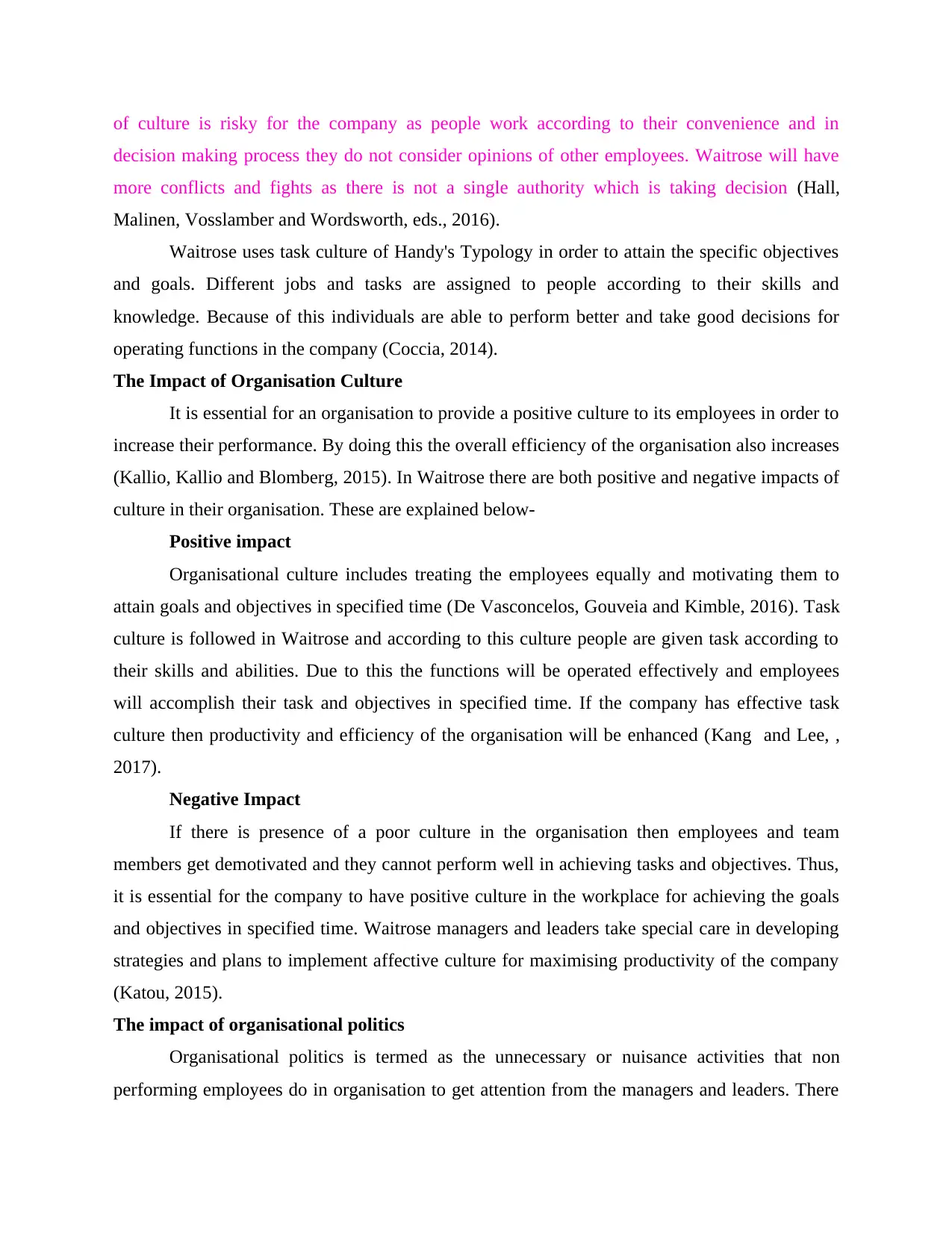
of culture is risky for the company as people work according to their convenience and in
decision making process they do not consider opinions of other employees. Waitrose will have
more conflicts and fights as there is not a single authority which is taking decision (Hall,
Malinen, Vosslamber and Wordsworth, eds., 2016).
Waitrose uses task culture of Handy's Typology in order to attain the specific objectives
and goals. Different jobs and tasks are assigned to people according to their skills and
knowledge. Because of this individuals are able to perform better and take good decisions for
operating functions in the company (Coccia, 2014).
The Impact of Organisation Culture
It is essential for an organisation to provide a positive culture to its employees in order to
increase their performance. By doing this the overall efficiency of the organisation also increases
(Kallio, Kallio and Blomberg, 2015). In Waitrose there are both positive and negative impacts of
culture in their organisation. These are explained below-
Positive impact
Organisational culture includes treating the employees equally and motivating them to
attain goals and objectives in specified time (De Vasconcelos, Gouveia and Kimble, 2016). Task
culture is followed in Waitrose and according to this culture people are given task according to
their skills and abilities. Due to this the functions will be operated effectively and employees
will accomplish their task and objectives in specified time. If the company has effective task
culture then productivity and efficiency of the organisation will be enhanced (Kang and Lee, ,
2017).
Negative Impact
If there is presence of a poor culture in the organisation then employees and team
members get demotivated and they cannot perform well in achieving tasks and objectives. Thus,
it is essential for the company to have positive culture in the workplace for achieving the goals
and objectives in specified time. Waitrose managers and leaders take special care in developing
strategies and plans to implement affective culture for maximising productivity of the company
(Katou, 2015).
The impact of organisational politics
Organisational politics is termed as the unnecessary or nuisance activities that non
performing employees do in organisation to get attention from the managers and leaders. There
decision making process they do not consider opinions of other employees. Waitrose will have
more conflicts and fights as there is not a single authority which is taking decision (Hall,
Malinen, Vosslamber and Wordsworth, eds., 2016).
Waitrose uses task culture of Handy's Typology in order to attain the specific objectives
and goals. Different jobs and tasks are assigned to people according to their skills and
knowledge. Because of this individuals are able to perform better and take good decisions for
operating functions in the company (Coccia, 2014).
The Impact of Organisation Culture
It is essential for an organisation to provide a positive culture to its employees in order to
increase their performance. By doing this the overall efficiency of the organisation also increases
(Kallio, Kallio and Blomberg, 2015). In Waitrose there are both positive and negative impacts of
culture in their organisation. These are explained below-
Positive impact
Organisational culture includes treating the employees equally and motivating them to
attain goals and objectives in specified time (De Vasconcelos, Gouveia and Kimble, 2016). Task
culture is followed in Waitrose and according to this culture people are given task according to
their skills and abilities. Due to this the functions will be operated effectively and employees
will accomplish their task and objectives in specified time. If the company has effective task
culture then productivity and efficiency of the organisation will be enhanced (Kang and Lee, ,
2017).
Negative Impact
If there is presence of a poor culture in the organisation then employees and team
members get demotivated and they cannot perform well in achieving tasks and objectives. Thus,
it is essential for the company to have positive culture in the workplace for achieving the goals
and objectives in specified time. Waitrose managers and leaders take special care in developing
strategies and plans to implement affective culture for maximising productivity of the company
(Katou, 2015).
The impact of organisational politics
Organisational politics is termed as the unnecessary or nuisance activities that non
performing employees do in organisation to get attention from the managers and leaders. There
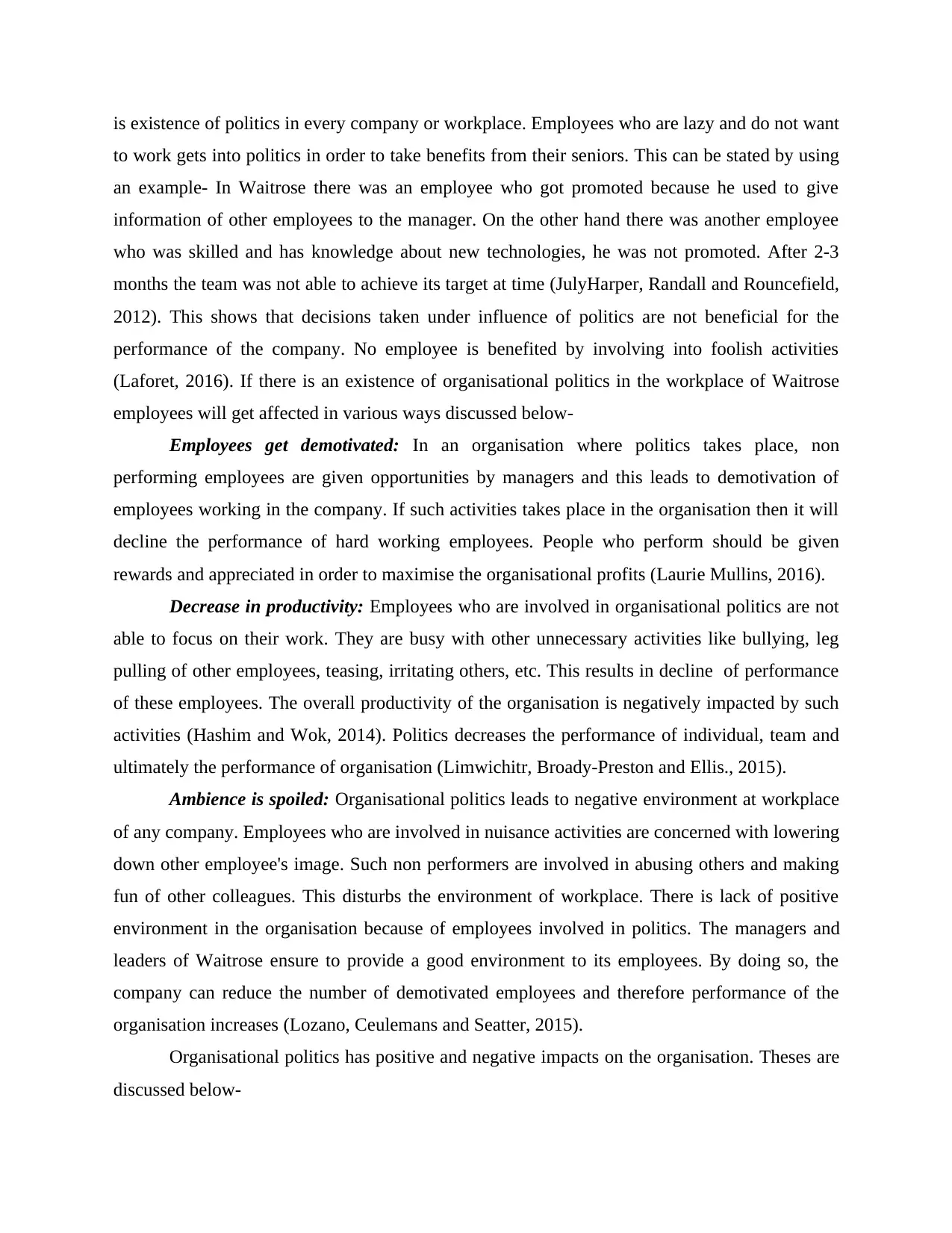
is existence of politics in every company or workplace. Employees who are lazy and do not want
to work gets into politics in order to take benefits from their seniors. This can be stated by using
an example- In Waitrose there was an employee who got promoted because he used to give
information of other employees to the manager. On the other hand there was another employee
who was skilled and has knowledge about new technologies, he was not promoted. After 2-3
months the team was not able to achieve its target at time (JulyHarper, Randall and Rouncefield,
2012). This shows that decisions taken under influence of politics are not beneficial for the
performance of the company. No employee is benefited by involving into foolish activities
(Laforet, 2016). If there is an existence of organisational politics in the workplace of Waitrose
employees will get affected in various ways discussed below-
Employees get demotivated: In an organisation where politics takes place, non
performing employees are given opportunities by managers and this leads to demotivation of
employees working in the company. If such activities takes place in the organisation then it will
decline the performance of hard working employees. People who perform should be given
rewards and appreciated in order to maximise the organisational profits (Laurie Mullins, 2016).
Decrease in productivity: Employees who are involved in organisational politics are not
able to focus on their work. They are busy with other unnecessary activities like bullying, leg
pulling of other employees, teasing, irritating others, etc. This results in decline of performance
of these employees. The overall productivity of the organisation is negatively impacted by such
activities (Hashim and Wok, 2014). Politics decreases the performance of individual, team and
ultimately the performance of organisation (Limwichitr, Broady-Preston and Ellis., 2015).
Ambience is spoiled: Organisational politics leads to negative environment at workplace
of any company. Employees who are involved in nuisance activities are concerned with lowering
down other employee's image. Such non performers are involved in abusing others and making
fun of other colleagues. This disturbs the environment of workplace. There is lack of positive
environment in the organisation because of employees involved in politics. The managers and
leaders of Waitrose ensure to provide a good environment to its employees. By doing so, the
company can reduce the number of demotivated employees and therefore performance of the
organisation increases (Lozano, Ceulemans and Seatter, 2015).
Organisational politics has positive and negative impacts on the organisation. Theses are
discussed below-
to work gets into politics in order to take benefits from their seniors. This can be stated by using
an example- In Waitrose there was an employee who got promoted because he used to give
information of other employees to the manager. On the other hand there was another employee
who was skilled and has knowledge about new technologies, he was not promoted. After 2-3
months the team was not able to achieve its target at time (JulyHarper, Randall and Rouncefield,
2012). This shows that decisions taken under influence of politics are not beneficial for the
performance of the company. No employee is benefited by involving into foolish activities
(Laforet, 2016). If there is an existence of organisational politics in the workplace of Waitrose
employees will get affected in various ways discussed below-
Employees get demotivated: In an organisation where politics takes place, non
performing employees are given opportunities by managers and this leads to demotivation of
employees working in the company. If such activities takes place in the organisation then it will
decline the performance of hard working employees. People who perform should be given
rewards and appreciated in order to maximise the organisational profits (Laurie Mullins, 2016).
Decrease in productivity: Employees who are involved in organisational politics are not
able to focus on their work. They are busy with other unnecessary activities like bullying, leg
pulling of other employees, teasing, irritating others, etc. This results in decline of performance
of these employees. The overall productivity of the organisation is negatively impacted by such
activities (Hashim and Wok, 2014). Politics decreases the performance of individual, team and
ultimately the performance of organisation (Limwichitr, Broady-Preston and Ellis., 2015).
Ambience is spoiled: Organisational politics leads to negative environment at workplace
of any company. Employees who are involved in nuisance activities are concerned with lowering
down other employee's image. Such non performers are involved in abusing others and making
fun of other colleagues. This disturbs the environment of workplace. There is lack of positive
environment in the organisation because of employees involved in politics. The managers and
leaders of Waitrose ensure to provide a good environment to its employees. By doing so, the
company can reduce the number of demotivated employees and therefore performance of the
organisation increases (Lozano, Ceulemans and Seatter, 2015).
Organisational politics has positive and negative impacts on the organisation. Theses are
discussed below-
⊘ This is a preview!⊘
Do you want full access?
Subscribe today to unlock all pages.

Trusted by 1+ million students worldwide
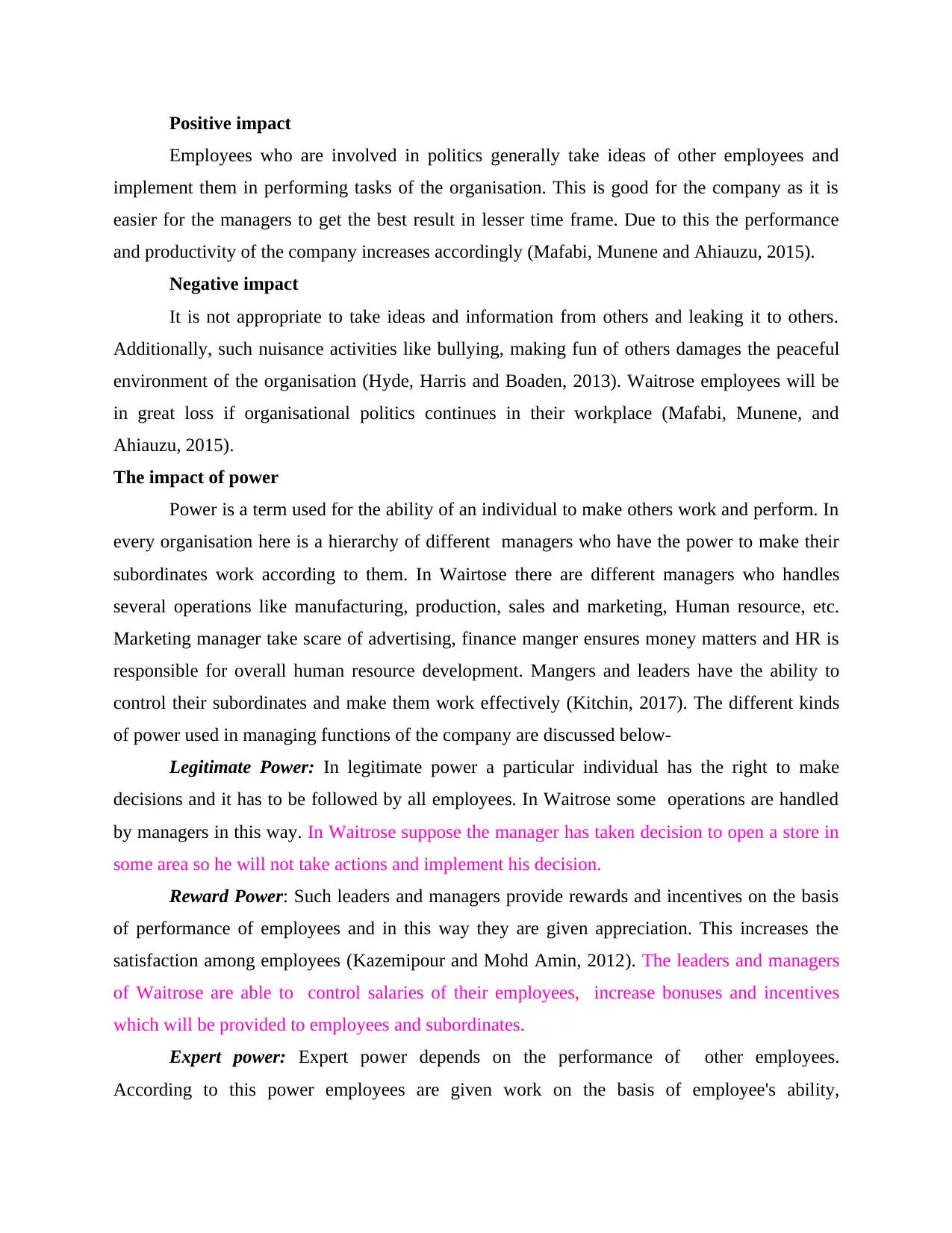
Positive impact
Employees who are involved in politics generally take ideas of other employees and
implement them in performing tasks of the organisation. This is good for the company as it is
easier for the managers to get the best result in lesser time frame. Due to this the performance
and productivity of the company increases accordingly (Mafabi, Munene and Ahiauzu, 2015).
Negative impact
It is not appropriate to take ideas and information from others and leaking it to others.
Additionally, such nuisance activities like bullying, making fun of others damages the peaceful
environment of the organisation (Hyde, Harris and Boaden, 2013). Waitrose employees will be
in great loss if organisational politics continues in their workplace (Mafabi, Munene, and
Ahiauzu, 2015).
The impact of power
Power is a term used for the ability of an individual to make others work and perform. In
every organisation here is a hierarchy of different managers who have the power to make their
subordinates work according to them. In Wairtose there are different managers who handles
several operations like manufacturing, production, sales and marketing, Human resource, etc.
Marketing manager take scare of advertising, finance manger ensures money matters and HR is
responsible for overall human resource development. Mangers and leaders have the ability to
control their subordinates and make them work effectively (Kitchin, 2017). The different kinds
of power used in managing functions of the company are discussed below-
Legitimate Power: In legitimate power a particular individual has the right to make
decisions and it has to be followed by all employees. In Waitrose some operations are handled
by managers in this way. In Waitrose suppose the manager has taken decision to open a store in
some area so he will not take actions and implement his decision.
Reward Power: Such leaders and managers provide rewards and incentives on the basis
of performance of employees and in this way they are given appreciation. This increases the
satisfaction among employees (Kazemipour and Mohd Amin, 2012). The leaders and managers
of Waitrose are able to control salaries of their employees, increase bonuses and incentives
which will be provided to employees and subordinates.
Expert power: Expert power depends on the performance of other employees.
According to this power employees are given work on the basis of employee's ability,
Employees who are involved in politics generally take ideas of other employees and
implement them in performing tasks of the organisation. This is good for the company as it is
easier for the managers to get the best result in lesser time frame. Due to this the performance
and productivity of the company increases accordingly (Mafabi, Munene and Ahiauzu, 2015).
Negative impact
It is not appropriate to take ideas and information from others and leaking it to others.
Additionally, such nuisance activities like bullying, making fun of others damages the peaceful
environment of the organisation (Hyde, Harris and Boaden, 2013). Waitrose employees will be
in great loss if organisational politics continues in their workplace (Mafabi, Munene, and
Ahiauzu, 2015).
The impact of power
Power is a term used for the ability of an individual to make others work and perform. In
every organisation here is a hierarchy of different managers who have the power to make their
subordinates work according to them. In Wairtose there are different managers who handles
several operations like manufacturing, production, sales and marketing, Human resource, etc.
Marketing manager take scare of advertising, finance manger ensures money matters and HR is
responsible for overall human resource development. Mangers and leaders have the ability to
control their subordinates and make them work effectively (Kitchin, 2017). The different kinds
of power used in managing functions of the company are discussed below-
Legitimate Power: In legitimate power a particular individual has the right to make
decisions and it has to be followed by all employees. In Waitrose some operations are handled
by managers in this way. In Waitrose suppose the manager has taken decision to open a store in
some area so he will not take actions and implement his decision.
Reward Power: Such leaders and managers provide rewards and incentives on the basis
of performance of employees and in this way they are given appreciation. This increases the
satisfaction among employees (Kazemipour and Mohd Amin, 2012). The leaders and managers
of Waitrose are able to control salaries of their employees, increase bonuses and incentives
which will be provided to employees and subordinates.
Expert power: Expert power depends on the performance of other employees.
According to this power employees are given work on the basis of employee's ability,
Paraphrase This Document
Need a fresh take? Get an instant paraphrase of this document with our AI Paraphraser
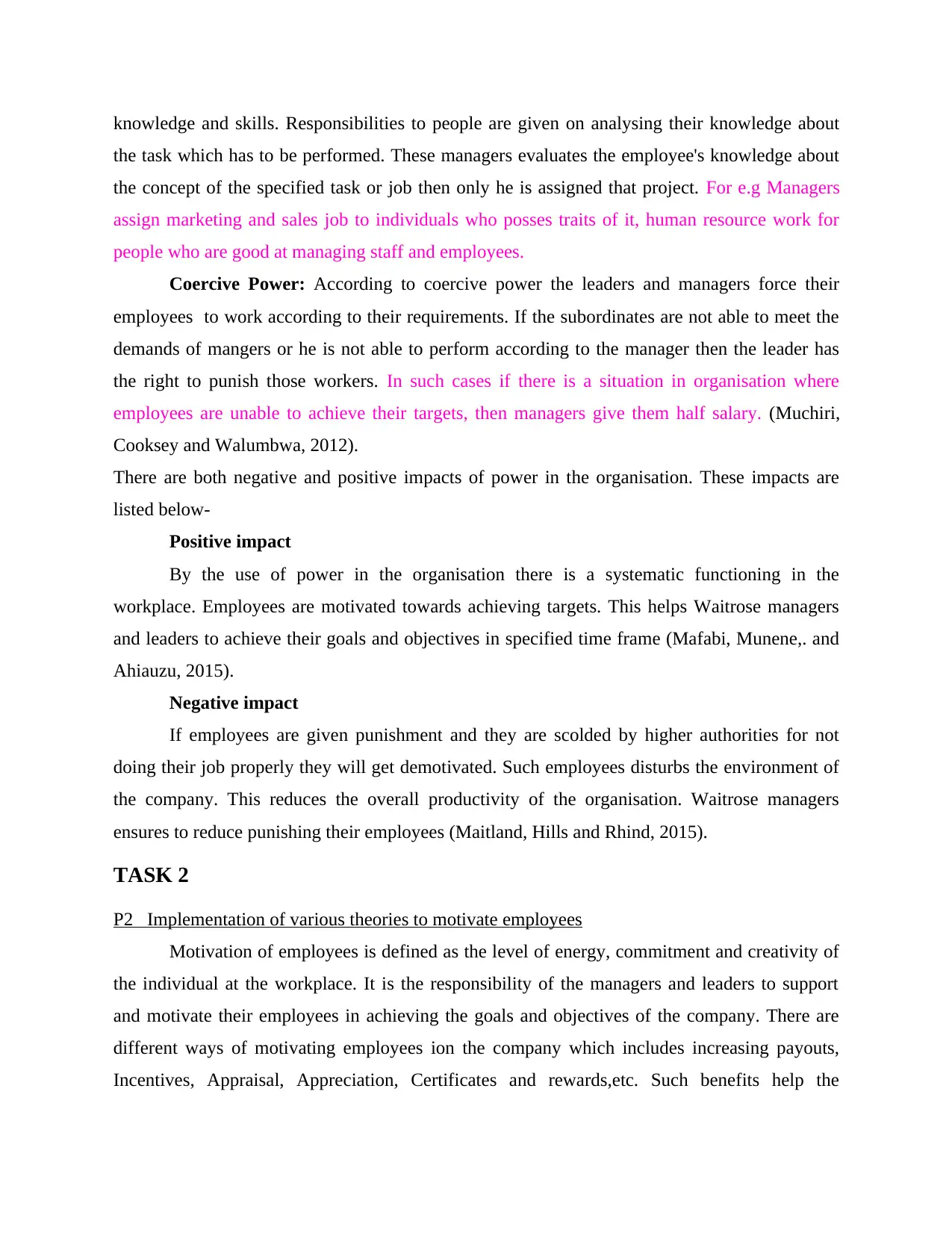
knowledge and skills. Responsibilities to people are given on analysing their knowledge about
the task which has to be performed. These managers evaluates the employee's knowledge about
the concept of the specified task or job then only he is assigned that project. For e.g Managers
assign marketing and sales job to individuals who posses traits of it, human resource work for
people who are good at managing staff and employees.
Coercive Power: According to coercive power the leaders and managers force their
employees to work according to their requirements. If the subordinates are not able to meet the
demands of mangers or he is not able to perform according to the manager then the leader has
the right to punish those workers. In such cases if there is a situation in organisation where
employees are unable to achieve their targets, then managers give them half salary. (Muchiri,
Cooksey and Walumbwa, 2012).
There are both negative and positive impacts of power in the organisation. These impacts are
listed below-
Positive impact
By the use of power in the organisation there is a systematic functioning in the
workplace. Employees are motivated towards achieving targets. This helps Waitrose managers
and leaders to achieve their goals and objectives in specified time frame (Mafabi, Munene,. and
Ahiauzu, 2015).
Negative impact
If employees are given punishment and they are scolded by higher authorities for not
doing their job properly they will get demotivated. Such employees disturbs the environment of
the company. This reduces the overall productivity of the organisation. Waitrose managers
ensures to reduce punishing their employees (Maitland, Hills and Rhind, 2015).
TASK 2
P2 Implementation of various theories to motivate employees
Motivation of employees is defined as the level of energy, commitment and creativity of
the individual at the workplace. It is the responsibility of the managers and leaders to support
and motivate their employees in achieving the goals and objectives of the company. There are
different ways of motivating employees ion the company which includes increasing payouts,
Incentives, Appraisal, Appreciation, Certificates and rewards,etc. Such benefits help the
the task which has to be performed. These managers evaluates the employee's knowledge about
the concept of the specified task or job then only he is assigned that project. For e.g Managers
assign marketing and sales job to individuals who posses traits of it, human resource work for
people who are good at managing staff and employees.
Coercive Power: According to coercive power the leaders and managers force their
employees to work according to their requirements. If the subordinates are not able to meet the
demands of mangers or he is not able to perform according to the manager then the leader has
the right to punish those workers. In such cases if there is a situation in organisation where
employees are unable to achieve their targets, then managers give them half salary. (Muchiri,
Cooksey and Walumbwa, 2012).
There are both negative and positive impacts of power in the organisation. These impacts are
listed below-
Positive impact
By the use of power in the organisation there is a systematic functioning in the
workplace. Employees are motivated towards achieving targets. This helps Waitrose managers
and leaders to achieve their goals and objectives in specified time frame (Mafabi, Munene,. and
Ahiauzu, 2015).
Negative impact
If employees are given punishment and they are scolded by higher authorities for not
doing their job properly they will get demotivated. Such employees disturbs the environment of
the company. This reduces the overall productivity of the organisation. Waitrose managers
ensures to reduce punishing their employees (Maitland, Hills and Rhind, 2015).
TASK 2
P2 Implementation of various theories to motivate employees
Motivation of employees is defined as the level of energy, commitment and creativity of
the individual at the workplace. It is the responsibility of the managers and leaders to support
and motivate their employees in achieving the goals and objectives of the company. There are
different ways of motivating employees ion the company which includes increasing payouts,
Incentives, Appraisal, Appreciation, Certificates and rewards,etc. Such benefits help the
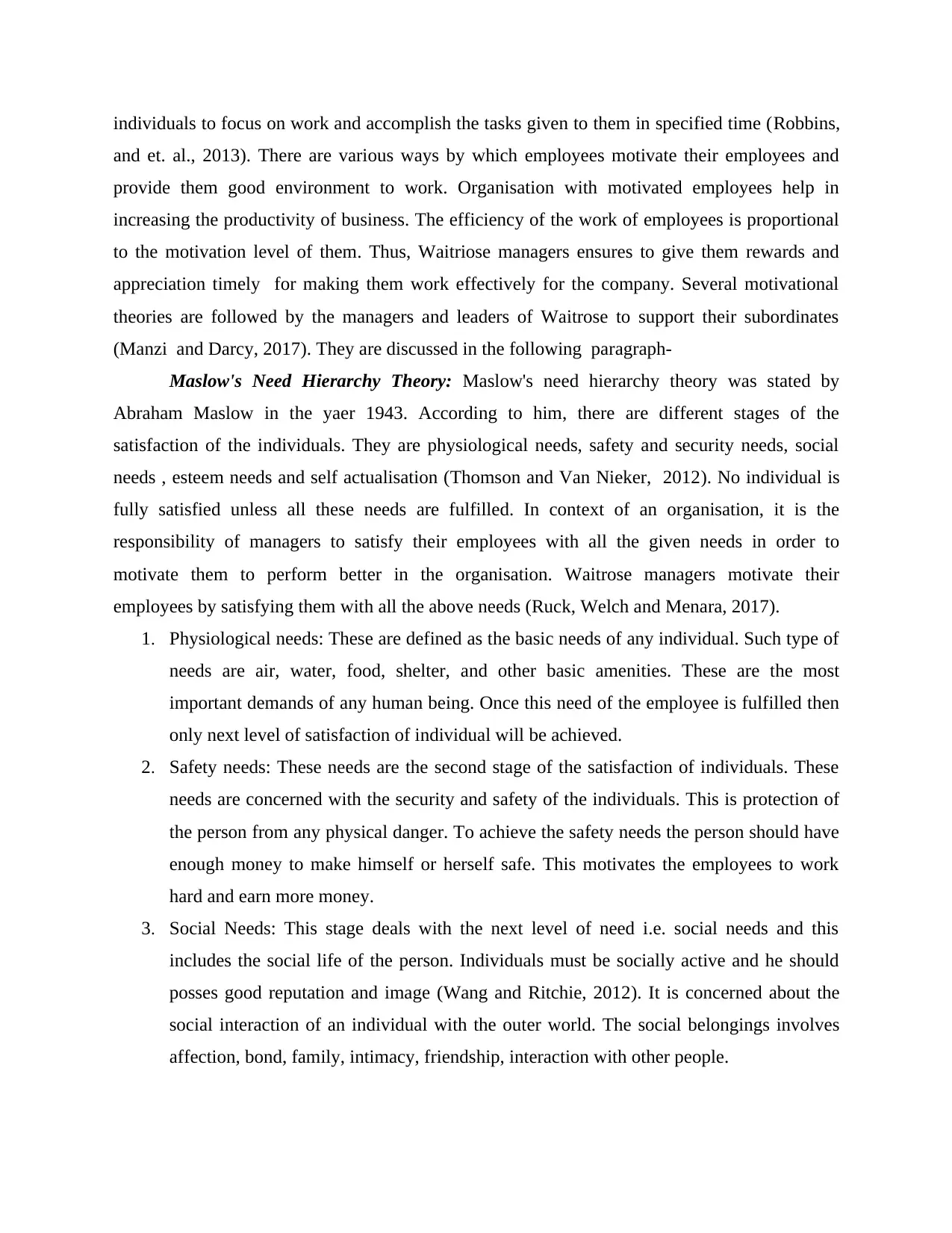
individuals to focus on work and accomplish the tasks given to them in specified time (Robbins,
and et. al., 2013). There are various ways by which employees motivate their employees and
provide them good environment to work. Organisation with motivated employees help in
increasing the productivity of business. The efficiency of the work of employees is proportional
to the motivation level of them. Thus, Waitriose managers ensures to give them rewards and
appreciation timely for making them work effectively for the company. Several motivational
theories are followed by the managers and leaders of Waitrose to support their subordinates
(Manzi and Darcy, 2017). They are discussed in the following paragraph-
Maslow's Need Hierarchy Theory: Maslow's need hierarchy theory was stated by
Abraham Maslow in the yaer 1943. According to him, there are different stages of the
satisfaction of the individuals. They are physiological needs, safety and security needs, social
needs , esteem needs and self actualisation (Thomson and Van Nieker, 2012). No individual is
fully satisfied unless all these needs are fulfilled. In context of an organisation, it is the
responsibility of managers to satisfy their employees with all the given needs in order to
motivate them to perform better in the organisation. Waitrose managers motivate their
employees by satisfying them with all the above needs (Ruck, Welch and Menara, 2017).
1. Physiological needs: These are defined as the basic needs of any individual. Such type of
needs are air, water, food, shelter, and other basic amenities. These are the most
important demands of any human being. Once this need of the employee is fulfilled then
only next level of satisfaction of individual will be achieved.
2. Safety needs: These needs are the second stage of the satisfaction of individuals. These
needs are concerned with the security and safety of the individuals. This is protection of
the person from any physical danger. To achieve the safety needs the person should have
enough money to make himself or herself safe. This motivates the employees to work
hard and earn more money.
3. Social Needs: This stage deals with the next level of need i.e. social needs and this
includes the social life of the person. Individuals must be socially active and he should
posses good reputation and image (Wang and Ritchie, 2012). It is concerned about the
social interaction of an individual with the outer world. The social belongings involves
affection, bond, family, intimacy, friendship, interaction with other people.
and et. al., 2013). There are various ways by which employees motivate their employees and
provide them good environment to work. Organisation with motivated employees help in
increasing the productivity of business. The efficiency of the work of employees is proportional
to the motivation level of them. Thus, Waitriose managers ensures to give them rewards and
appreciation timely for making them work effectively for the company. Several motivational
theories are followed by the managers and leaders of Waitrose to support their subordinates
(Manzi and Darcy, 2017). They are discussed in the following paragraph-
Maslow's Need Hierarchy Theory: Maslow's need hierarchy theory was stated by
Abraham Maslow in the yaer 1943. According to him, there are different stages of the
satisfaction of the individuals. They are physiological needs, safety and security needs, social
needs , esteem needs and self actualisation (Thomson and Van Nieker, 2012). No individual is
fully satisfied unless all these needs are fulfilled. In context of an organisation, it is the
responsibility of managers to satisfy their employees with all the given needs in order to
motivate them to perform better in the organisation. Waitrose managers motivate their
employees by satisfying them with all the above needs (Ruck, Welch and Menara, 2017).
1. Physiological needs: These are defined as the basic needs of any individual. Such type of
needs are air, water, food, shelter, and other basic amenities. These are the most
important demands of any human being. Once this need of the employee is fulfilled then
only next level of satisfaction of individual will be achieved.
2. Safety needs: These needs are the second stage of the satisfaction of individuals. These
needs are concerned with the security and safety of the individuals. This is protection of
the person from any physical danger. To achieve the safety needs the person should have
enough money to make himself or herself safe. This motivates the employees to work
hard and earn more money.
3. Social Needs: This stage deals with the next level of need i.e. social needs and this
includes the social life of the person. Individuals must be socially active and he should
posses good reputation and image (Wang and Ritchie, 2012). It is concerned about the
social interaction of an individual with the outer world. The social belongings involves
affection, bond, family, intimacy, friendship, interaction with other people.
⊘ This is a preview!⊘
Do you want full access?
Subscribe today to unlock all pages.

Trusted by 1+ million students worldwide
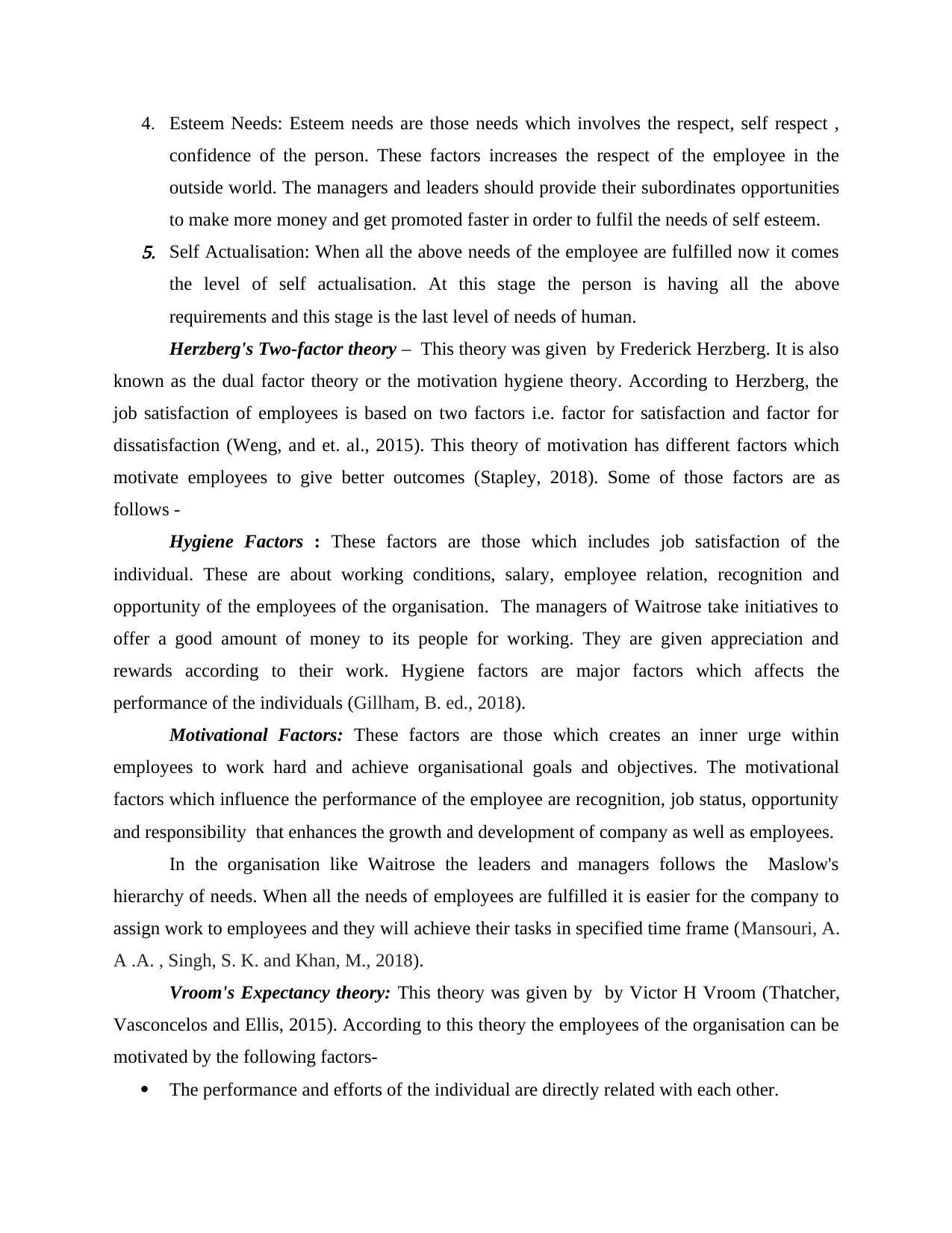
4. Esteem Needs: Esteem needs are those needs which involves the respect, self respect ,
confidence of the person. These factors increases the respect of the employee in the
outside world. The managers and leaders should provide their subordinates opportunities
to make more money and get promoted faster in order to fulfil the needs of self esteem.5. Self Actualisation: When all the above needs of the employee are fulfilled now it comes
the level of self actualisation. At this stage the person is having all the above
requirements and this stage is the last level of needs of human.
Herzberg's Two-factor theory – This theory was given by Frederick Herzberg. It is also
known as the dual factor theory or the motivation hygiene theory. According to Herzberg, the
job satisfaction of employees is based on two factors i.e. factor for satisfaction and factor for
dissatisfaction (Weng, and et. al., 2015). This theory of motivation has different factors which
motivate employees to give better outcomes (Stapley, 2018). Some of those factors are as
follows -
Hygiene Factors : These factors are those which includes job satisfaction of the
individual. These are about working conditions, salary, employee relation, recognition and
opportunity of the employees of the organisation. The managers of Waitrose take initiatives to
offer a good amount of money to its people for working. They are given appreciation and
rewards according to their work. Hygiene factors are major factors which affects the
performance of the individuals (Gillham, B. ed., 2018).
Motivational Factors: These factors are those which creates an inner urge within
employees to work hard and achieve organisational goals and objectives. The motivational
factors which influence the performance of the employee are recognition, job status, opportunity
and responsibility that enhances the growth and development of company as well as employees.
In the organisation like Waitrose the leaders and managers follows the Maslow's
hierarchy of needs. When all the needs of employees are fulfilled it is easier for the company to
assign work to employees and they will achieve their tasks in specified time frame (Mansouri, A.
A .A. , Singh, S. K. and Khan, M., 2018).
Vroom's Expectancy theory: This theory was given by by Victor H Vroom (Thatcher,
Vasconcelos and Ellis, 2015). According to this theory the employees of the organisation can be
motivated by the following factors-
The performance and efforts of the individual are directly related with each other.
confidence of the person. These factors increases the respect of the employee in the
outside world. The managers and leaders should provide their subordinates opportunities
to make more money and get promoted faster in order to fulfil the needs of self esteem.5. Self Actualisation: When all the above needs of the employee are fulfilled now it comes
the level of self actualisation. At this stage the person is having all the above
requirements and this stage is the last level of needs of human.
Herzberg's Two-factor theory – This theory was given by Frederick Herzberg. It is also
known as the dual factor theory or the motivation hygiene theory. According to Herzberg, the
job satisfaction of employees is based on two factors i.e. factor for satisfaction and factor for
dissatisfaction (Weng, and et. al., 2015). This theory of motivation has different factors which
motivate employees to give better outcomes (Stapley, 2018). Some of those factors are as
follows -
Hygiene Factors : These factors are those which includes job satisfaction of the
individual. These are about working conditions, salary, employee relation, recognition and
opportunity of the employees of the organisation. The managers of Waitrose take initiatives to
offer a good amount of money to its people for working. They are given appreciation and
rewards according to their work. Hygiene factors are major factors which affects the
performance of the individuals (Gillham, B. ed., 2018).
Motivational Factors: These factors are those which creates an inner urge within
employees to work hard and achieve organisational goals and objectives. The motivational
factors which influence the performance of the employee are recognition, job status, opportunity
and responsibility that enhances the growth and development of company as well as employees.
In the organisation like Waitrose the leaders and managers follows the Maslow's
hierarchy of needs. When all the needs of employees are fulfilled it is easier for the company to
assign work to employees and they will achieve their tasks in specified time frame (Mansouri, A.
A .A. , Singh, S. K. and Khan, M., 2018).
Vroom's Expectancy theory: This theory was given by by Victor H Vroom (Thatcher,
Vasconcelos and Ellis, 2015). According to this theory the employees of the organisation can be
motivated by the following factors-
The performance and efforts of the individual are directly related with each other.
Paraphrase This Document
Need a fresh take? Get an instant paraphrase of this document with our AI Paraphraser
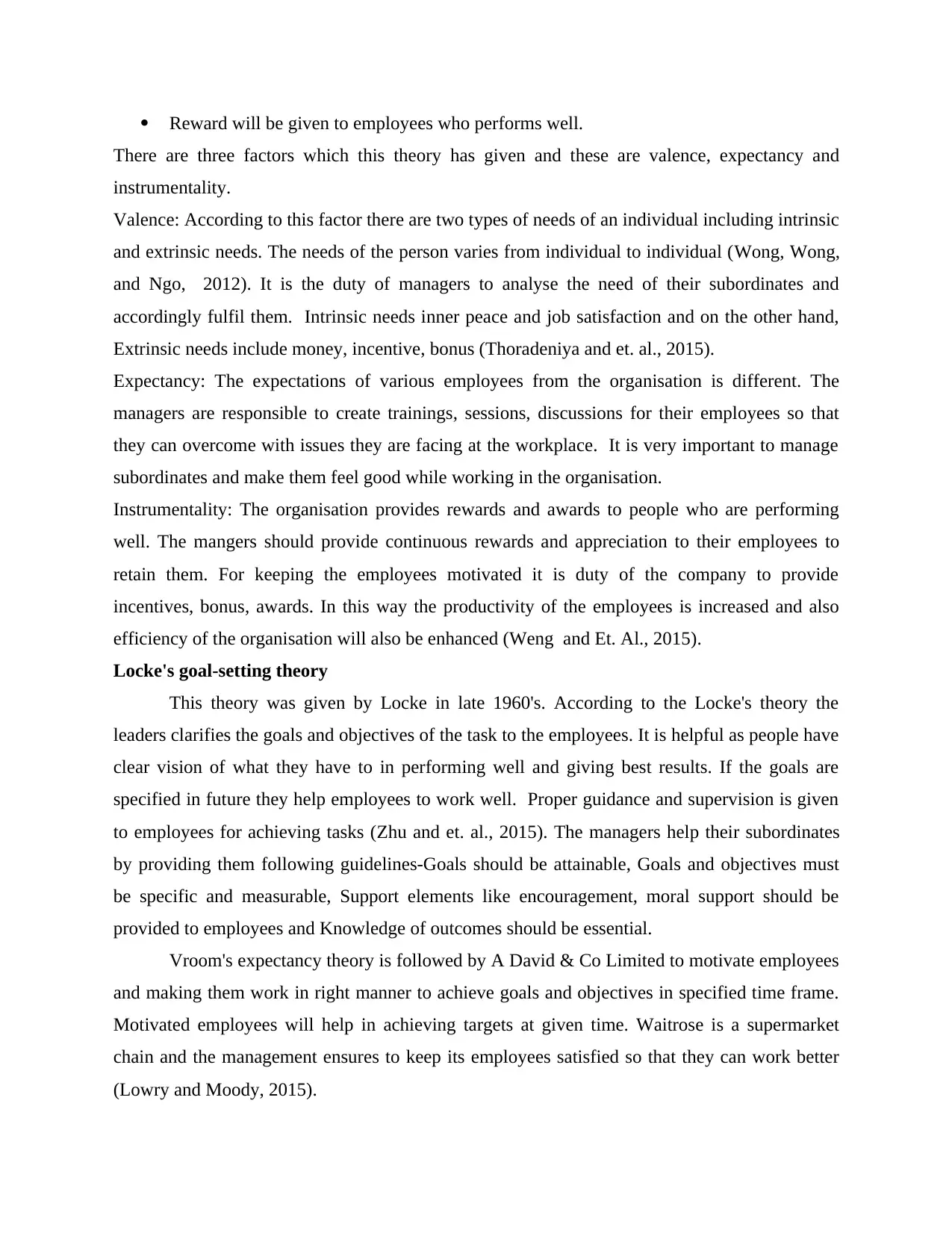
Reward will be given to employees who performs well.
There are three factors which this theory has given and these are valence, expectancy and
instrumentality.
Valence: According to this factor there are two types of needs of an individual including intrinsic
and extrinsic needs. The needs of the person varies from individual to individual (Wong, Wong,
and Ngo, 2012). It is the duty of managers to analyse the need of their subordinates and
accordingly fulfil them. Intrinsic needs inner peace and job satisfaction and on the other hand,
Extrinsic needs include money, incentive, bonus (Thoradeniya and et. al., 2015).
Expectancy: The expectations of various employees from the organisation is different. The
managers are responsible to create trainings, sessions, discussions for their employees so that
they can overcome with issues they are facing at the workplace. It is very important to manage
subordinates and make them feel good while working in the organisation.
Instrumentality: The organisation provides rewards and awards to people who are performing
well. The mangers should provide continuous rewards and appreciation to their employees to
retain them. For keeping the employees motivated it is duty of the company to provide
incentives, bonus, awards. In this way the productivity of the employees is increased and also
efficiency of the organisation will also be enhanced (Weng and Et. Al., 2015).
Locke's goal-setting theory
This theory was given by Locke in late 1960's. According to the Locke's theory the
leaders clarifies the goals and objectives of the task to the employees. It is helpful as people have
clear vision of what they have to in performing well and giving best results. If the goals are
specified in future they help employees to work well. Proper guidance and supervision is given
to employees for achieving tasks (Zhu and et. al., 2015). The managers help their subordinates
by providing them following guidelines-Goals should be attainable, Goals and objectives must
be specific and measurable, Support elements like encouragement, moral support should be
provided to employees and Knowledge of outcomes should be essential.
Vroom's expectancy theory is followed by A David & Co Limited to motivate employees
and making them work in right manner to achieve goals and objectives in specified time frame.
Motivated employees will help in achieving targets at given time. Waitrose is a supermarket
chain and the management ensures to keep its employees satisfied so that they can work better
(Lowry and Moody, 2015).
There are three factors which this theory has given and these are valence, expectancy and
instrumentality.
Valence: According to this factor there are two types of needs of an individual including intrinsic
and extrinsic needs. The needs of the person varies from individual to individual (Wong, Wong,
and Ngo, 2012). It is the duty of managers to analyse the need of their subordinates and
accordingly fulfil them. Intrinsic needs inner peace and job satisfaction and on the other hand,
Extrinsic needs include money, incentive, bonus (Thoradeniya and et. al., 2015).
Expectancy: The expectations of various employees from the organisation is different. The
managers are responsible to create trainings, sessions, discussions for their employees so that
they can overcome with issues they are facing at the workplace. It is very important to manage
subordinates and make them feel good while working in the organisation.
Instrumentality: The organisation provides rewards and awards to people who are performing
well. The mangers should provide continuous rewards and appreciation to their employees to
retain them. For keeping the employees motivated it is duty of the company to provide
incentives, bonus, awards. In this way the productivity of the employees is increased and also
efficiency of the organisation will also be enhanced (Weng and Et. Al., 2015).
Locke's goal-setting theory
This theory was given by Locke in late 1960's. According to the Locke's theory the
leaders clarifies the goals and objectives of the task to the employees. It is helpful as people have
clear vision of what they have to in performing well and giving best results. If the goals are
specified in future they help employees to work well. Proper guidance and supervision is given
to employees for achieving tasks (Zhu and et. al., 2015). The managers help their subordinates
by providing them following guidelines-Goals should be attainable, Goals and objectives must
be specific and measurable, Support elements like encouragement, moral support should be
provided to employees and Knowledge of outcomes should be essential.
Vroom's expectancy theory is followed by A David & Co Limited to motivate employees
and making them work in right manner to achieve goals and objectives in specified time frame.
Motivated employees will help in achieving targets at given time. Waitrose is a supermarket
chain and the management ensures to keep its employees satisfied so that they can work better
(Lowry and Moody, 2015).
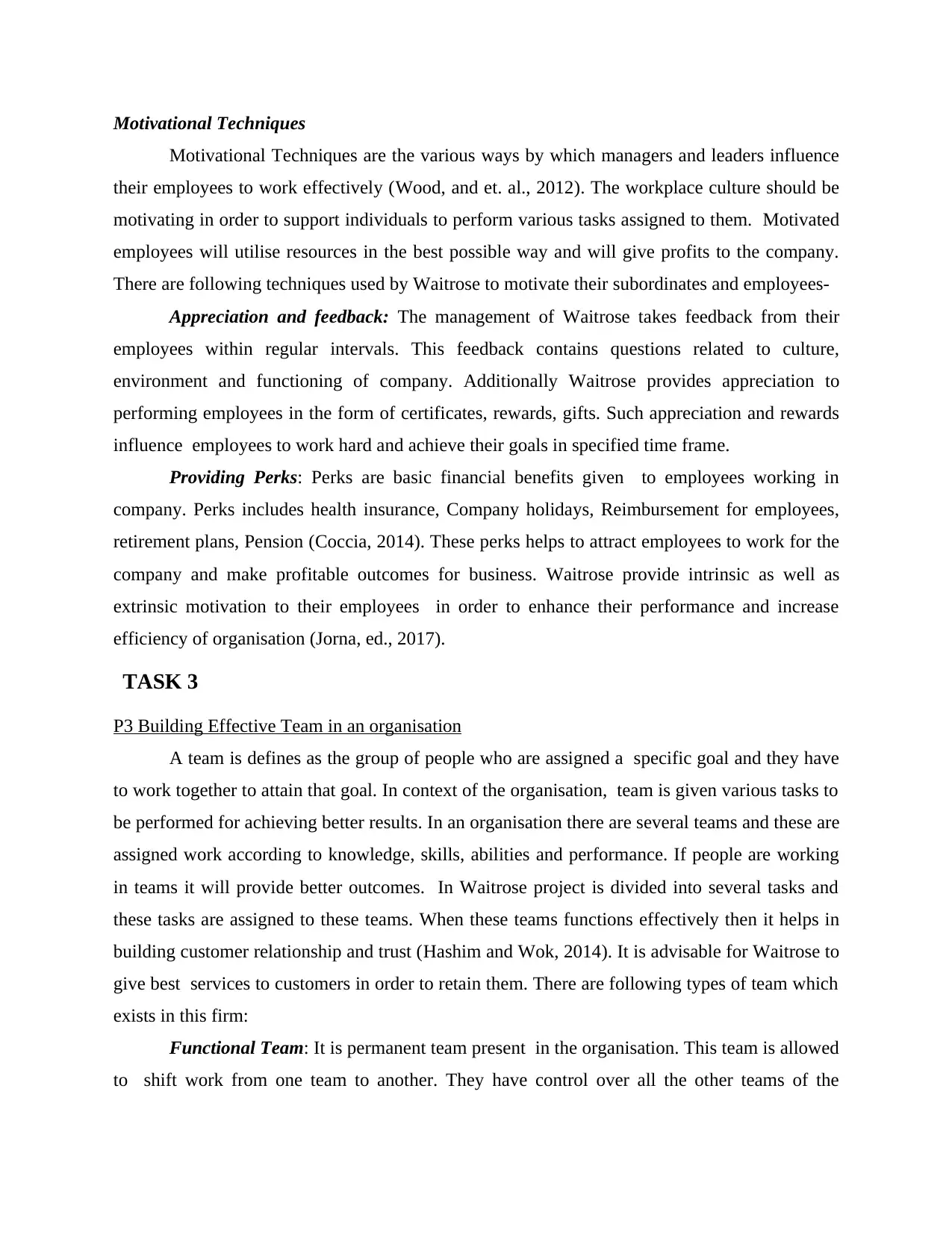
Motivational Techniques
Motivational Techniques are the various ways by which managers and leaders influence
their employees to work effectively (Wood, and et. al., 2012). The workplace culture should be
motivating in order to support individuals to perform various tasks assigned to them. Motivated
employees will utilise resources in the best possible way and will give profits to the company.
There are following techniques used by Waitrose to motivate their subordinates and employees-
Appreciation and feedback: The management of Waitrose takes feedback from their
employees within regular intervals. This feedback contains questions related to culture,
environment and functioning of company. Additionally Waitrose provides appreciation to
performing employees in the form of certificates, rewards, gifts. Such appreciation and rewards
influence employees to work hard and achieve their goals in specified time frame.
Providing Perks: Perks are basic financial benefits given to employees working in
company. Perks includes health insurance, Company holidays, Reimbursement for employees,
retirement plans, Pension (Coccia, 2014). These perks helps to attract employees to work for the
company and make profitable outcomes for business. Waitrose provide intrinsic as well as
extrinsic motivation to their employees in order to enhance their performance and increase
efficiency of organisation (Jorna, ed., 2017).
TASK 3
P3 Building Effective Team in an organisation
A team is defines as the group of people who are assigned a specific goal and they have
to work together to attain that goal. In context of the organisation, team is given various tasks to
be performed for achieving better results. In an organisation there are several teams and these are
assigned work according to knowledge, skills, abilities and performance. If people are working
in teams it will provide better outcomes. In Waitrose project is divided into several tasks and
these tasks are assigned to these teams. When these teams functions effectively then it helps in
building customer relationship and trust (Hashim and Wok, 2014). It is advisable for Waitrose to
give best services to customers in order to retain them. There are following types of team which
exists in this firm:
Functional Team: It is permanent team present in the organisation. This team is allowed
to shift work from one team to another. They have control over all the other teams of the
Motivational Techniques are the various ways by which managers and leaders influence
their employees to work effectively (Wood, and et. al., 2012). The workplace culture should be
motivating in order to support individuals to perform various tasks assigned to them. Motivated
employees will utilise resources in the best possible way and will give profits to the company.
There are following techniques used by Waitrose to motivate their subordinates and employees-
Appreciation and feedback: The management of Waitrose takes feedback from their
employees within regular intervals. This feedback contains questions related to culture,
environment and functioning of company. Additionally Waitrose provides appreciation to
performing employees in the form of certificates, rewards, gifts. Such appreciation and rewards
influence employees to work hard and achieve their goals in specified time frame.
Providing Perks: Perks are basic financial benefits given to employees working in
company. Perks includes health insurance, Company holidays, Reimbursement for employees,
retirement plans, Pension (Coccia, 2014). These perks helps to attract employees to work for the
company and make profitable outcomes for business. Waitrose provide intrinsic as well as
extrinsic motivation to their employees in order to enhance their performance and increase
efficiency of organisation (Jorna, ed., 2017).
TASK 3
P3 Building Effective Team in an organisation
A team is defines as the group of people who are assigned a specific goal and they have
to work together to attain that goal. In context of the organisation, team is given various tasks to
be performed for achieving better results. In an organisation there are several teams and these are
assigned work according to knowledge, skills, abilities and performance. If people are working
in teams it will provide better outcomes. In Waitrose project is divided into several tasks and
these tasks are assigned to these teams. When these teams functions effectively then it helps in
building customer relationship and trust (Hashim and Wok, 2014). It is advisable for Waitrose to
give best services to customers in order to retain them. There are following types of team which
exists in this firm:
Functional Team: It is permanent team present in the organisation. This team is allowed
to shift work from one team to another. They have control over all the other teams of the
⊘ This is a preview!⊘
Do you want full access?
Subscribe today to unlock all pages.

Trusted by 1+ million students worldwide
1 out of 21
Related Documents
Your All-in-One AI-Powered Toolkit for Academic Success.
+13062052269
info@desklib.com
Available 24*7 on WhatsApp / Email
![[object Object]](/_next/static/media/star-bottom.7253800d.svg)
Unlock your academic potential
Copyright © 2020–2026 A2Z Services. All Rights Reserved. Developed and managed by ZUCOL.




